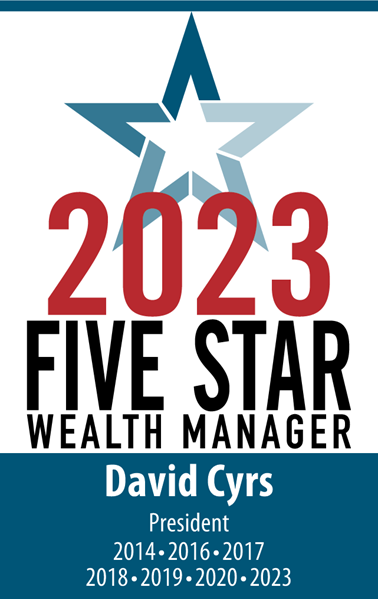PROFESSIONAL ACCOMPLISHMENTS
AWARDS
- Five Star Wealth Manager award winner 2014, 2016, 2017, 2018, 2019, 2020 and 2023
- 2018 - 2022 Vista Club Advisor, a distinction based on annual production that places him among the top 26 percent of advisors affiliated with Commonwealth Financial Network®
Retirement Sense Article
By DAVID CYRS, M.S., CERTIFIED FINANCIAL PLANNER™, Certified Retirement Counselor®
Three major retirement risks include market volatility Inflation and longevity risk. MARKET VOLATILITY can cause frustration before retirement. But during retirement, a lack of growth can devastate your financial plans. Keep in mind when markets decline as you are withdrawing for income, your assets have to work harder to keep you on track.
INFLATION, remember what you could buy for a dollar. Today you may need as much as $5.76 to buy what you did with $1 in 1970.(1). That is an example of inflation in action, and your retirement needs to keep pace or beat it, in order to preserve your purchasing power. If inflation grows faster than your investments, you’re actually losing money.
LONGEVITY. Living a much longer life. The good news is that Americans are living longer lives. Woman reaching age 65 have a one in four chance of living to age 94. For men its age 92. (2) Living a longer life requires you to make your retirement savings last.
There are many ways to plan for and take income in retirement and a common approach is known as systematic withdrawal. But it is important to also take into account where in a market cycle you may be starting retirement income. A downturn similar to 2001-2002, and 2008-2009 in the early years of retirement can dramatically affect future withdrawals. This makes it all the more important to also consider strategy that balances the risk of early retirement downturns with the need for income throughout retirement. The volatility and unpredictable nature of financial markets means every investor runs the risk of running out of money in retirement, particularly with losses in the early years of retirement.
At times it can appear the deck is stacked against you. But it doesn’t have to be. There are ways to mitigate risks and a planning process can incorporate them. Consider the following steps;
o Estimate the duration of retirement assets
o Identify and manage retirement risk. (Including Market Volatility, Inflation and Longevity risk)
o Identify distribution tax and estate issues and opportunities
o Identify options for addressing gaps to desired income
o Convert Resources into Income
o Maintain and update the plan with an independent advisor annually
Today, many retirees aren’t ready to settle for an unstructured life full of Sundays. Instead, they may be busy pursuing their passions, going back to school, joining the Peace Corps, starting new businesses, traveling to exotic places, reconnecting with far-flung friends and family, tackling athletic challenges, and sharing their talents and skills with others. These factors also come into play in arriving at desired income levels during retirement.
So, as you plan for retirement financially, it’s also important to more than just visualize your next stage of life. Plan to get there, means making a plan to achieve your goals. It is one key to enjoying the productive, fulfilling retirement you’ve envisioned!
###
Based upon Consumer Price index for all urban consumers (CPI-U) 1970-2012. Source for Data, US Dept of Labor, Bureau of Labor Statistics. (2) Annuity 2000 Mortality table, Society of Actuaries.
Trust Planning
Some of reasons why individuals—wealthy or not—set up a trust. They include:
· Trusts avoid the probate process.
· Trusts can be designed to remove assets from the grantor’s taxable estate.
· Trusts enable grantors to control “how and when” their property is distributed, even after death. The trust document can be written to specify who will benefit and to what extent; whether the property or assets may be sold or used for certain purposes; and who will benefit from the trust in the future.
· Trusts provide a great deal of flexibility in how the property is distributed, which can protect beneficiaries who may not be inclined to make sound financial decisions.
· Trusts can be used to preserve assets for minor beneficiaries until they are grown.
· Trusts can be used to help a grantor protect and manage his or her assets in the event he or she becomes incapacitated.
· Trusts typically more difficult to contest than wills.
· Trust can be able to shield assets from creditors.
Revocable Grantor Trust
Irrevocable (Nongrantor) Trust
· Grantor retains control over trust property and can modify or revoke the trust at any time. Grantor is considered to hold primary beneficial interest in the trust.
· Grantor is treated as owner of the trust for income tax purposes; trust income is taxable to grantor at grantor’s rate.
· Trust becomes irrevocable upon grantor’s death; property in the trust is includable in grantor’s estate.
· Grantor gives up all control over trust property and cannot alter or revoke the trust.
· Trust is considered a separate tax-paying entity; trust income is taxable to the trust at trust rates.
· The income and gain on assets in the trust are not included in grantor’s estate.
David listens to clients and creates succesful investment and Estate Plans and leads people to goal based success driven outcomes. He is motivated by client success. His energy and enthusiasm for making a difference in peoples lives, is apparent in all engagements. David brings valuable experience to working with business owners, executives, physicians, and those planning for or near retirement. For more than 30 years, he has been executing financial planning and capital management strategies, and the past 20 years applying his skills at the individual and family trust level. Having designed and developed retirement plans and welfare benefit plans for many of the largest employers in the Northern Illinois region, he has pariticuar expertise in retirement, tax and estate planning.
David believes in giving back to his community and does so by volunteering at his church and serving in various trusted community leadership positions, including years with the Rockford-area Chamber Leadership mentorship program, 10 years as a board member for the MILL Youth Center and Mill Foundation for disadvantaged youth, and 6 years on the board of directors for the Rosecrance Health Network Foundation and Rosecrance Health Network.
He loves the outdoors and spending time at "the Lake in Northern Wisconsin." Fishing, boating, and golfing are his favorite outdoor activities. He particularly likes reading history and is a "shareholder" of the Green Bay Packers. He is always most happy enjoying outdoor activities with his now adult children, even an occasional basketball pickup game, family football, or skiing event.
David holds the Certified Retirement Counselor® (CRC®) designation and has earned the trusted advisor role for discerning financial professionals, including CPAs, corporate controllers, and lawyers. He is highly experienced in developing and implementing customized asset management strategies, in addition to engineered retirement portfolio/investment management solutions with the goal of making a positive difference in others' lives. He is knowledgeable and experienced in individual tax planning, estate planning, intergenerational wealth transfer, and strategic charitable philanthropy. He obtained the Accredited Investment Fiduciary®(AIF®) designation in 2006. He has unique thoughts and knowledge in health care financial planning.
David has a BA in financial management/economics and an MS in business. He holds the CERTIFIED FINANCIAL PLANNER™ certification and brings decades of executive-level corporate strategic financial planning, capital management, and investment experience to clients. Registered in General Securities since 1995, he founded CYRS Wealth Advisors in 2007, specializing in private, independent retirement, and fee-based consultative investment management solutions.


